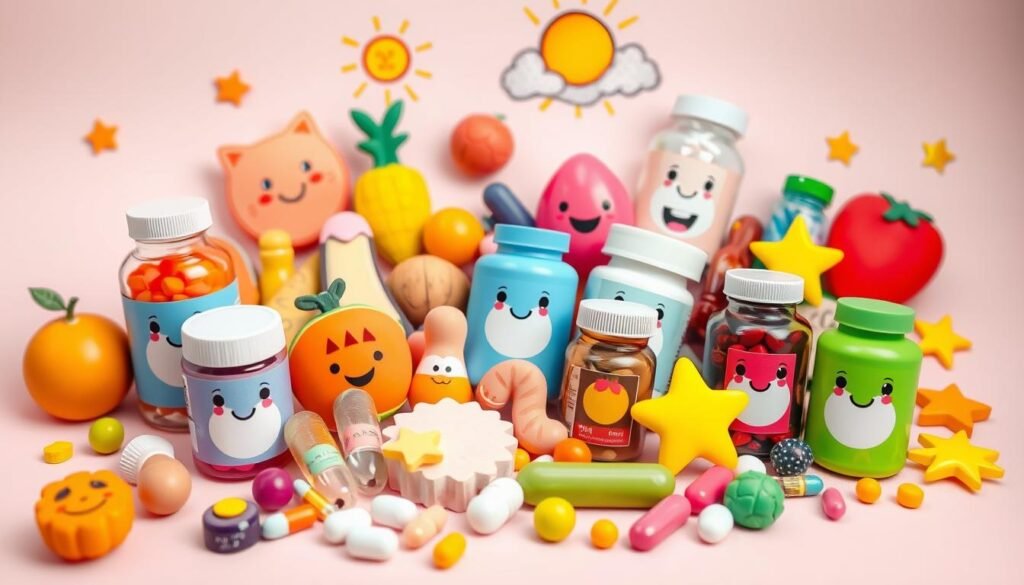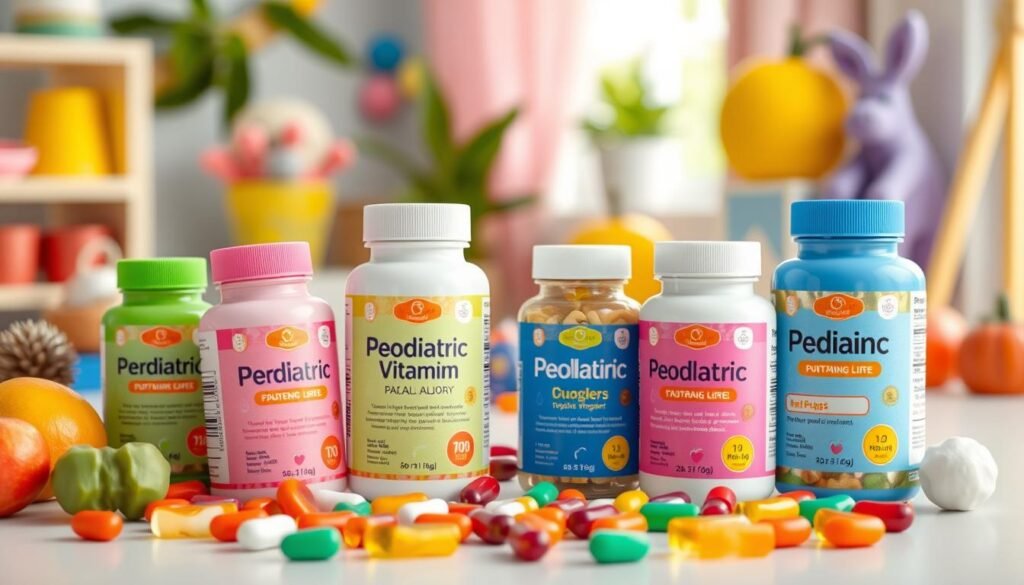
Kid-Friendly Vitamins: Keeping Your Little Ones Healthy
“Children are the world’s most valuable resource and its best hope for the future.” — John F. Kennedy
Kids vitamins can help with strong bones and sharp minds. Parents look for safe ways to support their kids’ growth and keep their immune systems strong.
Families aim to fill any nutritional gaps their kids might have. Kids vitamins can give them that extra confidence. They work best when paired with a balanced diet to help kids stay healthy.
Key Takeaways
- Kids vitamins cater to children’s unique dietary needs
- They may offer added support for immune health
- Parents look for quality and safety when choosing supplements
- Proper servings matter for consistent results
- Pairing supplements with whole foods leads to better outcomes
Understanding Children’s Nutritional Needs
Children do best when they eat a variety of healthy foods all day. Foods like fruits, veggies, grains, and proteins are key for their growth and brain health. The American Academy of Pediatrics says vitamins and minerals can help fill any gaps in their diet during important growth times.
Parents looking into children’s supplements often focus on more than just protein and carbs. Nutrients like iron, calcium, and B vitamins are important for energy and keeping kids active. It’s important to read labels, know the right serving sizes, and watch for any health issues.
- Calcium supports strengthening bone structure.
- Iron assists with healthy blood cell production.
- B Vitamins aid in metabolic processes.
| Nutrient | Role in Nutrition |
|---|---|
| Vitamin D | Essential for strong bones and teeth |
| Vitamin C | Supports immune system and healing |
| Zinc | Helps maintain healthy growth patterns |
Why Kids Benefit from Vitamin Supplements
Young bodies need balanced nutrition with essential vitamins. Sometimes, it’s hard to get all the vitamins from food alone. Supplements help fill these gaps without adding extra steps to a child’s day.
The Role of Micronutrients
Vitamins A, C, and D are key for clear vision, a strong immune system, and growing bones. B vitamins boost energy and metabolism. Parents see their kids become healthier and more full of energy when they focus on these nutrients.
“Steady intake of vital nutrients can help protect against common dietary shortfalls in growing kids.”
Addressing Nutritional Gaps
Some kids might miss out on vitamins or minerals because of their eating habits. Gummy vitamins are a tasty way to ensure they get what they need. They give parents confidence that their kids are getting enough nutrients, even when meals are not perfect.
Key Vitamins and Their Impact on Growth
Children need important nutrients to stay healthy and active. best kids vitamins help fill gaps when schedules get busy. Three key vitamins are vital for daily health.
Vitamin A for Healthy Vision
Vitamin A helps with clear vision in all light conditions. It supports cell growth and tissue repair. This makes it essential for development.
Vitamin C for Immune Support
Vitamin C boosts the body’s defense against daily threats. It aids in healing cuts and bruises faster. A good amount helps kids recover quickly.
Vitamin D for Bone Development
Vitamin D helps bones absorb calcium. This strengthens teeth and bones. Many families choose vitamins with vitamin D for its growth benefits. The right kids vitamins can meet their daily needs.
The Importance of Pediatric Vitamins
Childhood is a time of growth, and kids need extra nutrients. A good diet is key, but sometimes kids don’t eat well or are too busy. Pediatric vitamins, like Flintstones, offer a gentle way to support their health.
Parents might pick these supplements for a few reasons:
- Immune defense during seasonal changes
- Extra nutritional backup when diets exclude key food groups
- Support for active kids with high energy demands
Pediatric formulas mix vitamins A, B, C, D, and E. Multivitamins for kids act as a backup if meals lack important nutrients. It’s important to check labels, compare brands, and follow doctor advice.
| Vitamin | Potential Benefit | Common Food Source |
|---|---|---|
| A | Healthy eyesight | Sweet potatoes |
| C | Immune defense | Citrus fruits |
| D | Bone health | Fortified milk |
Gummy Vitamins for Kids: Pros and Cons
Fruit-flavored supplements are a hit with kids because they’re soft and sweet. They’re easy to add to daily routines, which is great for kids who don’t like swallowing pills. Parents find them a convenient way to give their kids nutrients.
These chewy options are good for a wide age range, making them a practical choice. The bright colors excite kids and make them want to take them every day. But, it’s important to remember that too much sugar can harm teeth and health.
The Appeal of Chewable Supplements
Many brands offer different flavors like strawberry and citrus. This variety makes it fun for kids to take their vitamins. Some products have vitamins and minerals that are just right for kids.
- Palatable taste for everyday use
- Lower choking risk than standard tablets
- Potentially promotes better adherence
Potential Drawbacks of Sugary Options
Too much sugar in gummies can hurt teeth if kids eat them all day. Brushing teeth regularly helps keep sugar from causing cavities. It’s smart to check labels for artificial stuff, as simple ingredients are better for kids’ teeth.
| Feature | Consideration |
|---|---|
| Flavor | Fruit blends that appeal to kids |
| Sugar Content | Potential for cavities if overused |
| Nutrient Supply | Provides vitamins but must be carefully balanced |
Multivitamins for Children: Choosing the Right Blend
Young bodies need support that fits their growth stage. A mix of key nutrients can help fill gaps and support growth. Parents look at ingredients, daily values, and reputation before choosing.

Many brands offer formulas for different ages. Some have iron or zinc, while others boost immune health. It’s important to read labels and get advice from pediatricians to meet a child’s needs safely.
For toddlers, vitamins come in gentle doses. These blends are made for smaller bodies. Options like chewables or liquids make taking vitamins easier and more fun. Always check serving sizes and trusted sources for safe support.
Considering Vitamins for Toddlers
Toddlers need special vitamins because their bodies are small and process nutrients differently. It’s important to pick the right vitamins for them. Many parents use kids health supplements to help their toddlers grow. But, it’s key to know how much to give and what tastes good to them.
Age-Appropriate Dosages
Pediatric experts say to start with the smallest amount recommended. Toddlers need much less than older kids. It’s important to follow these guidelines to keep their nutrition safe:
- Check the label for daily limits
- Follow medical advice if your child has special conditions
- Consider single-nutrient formulas before stacking multiple ingredients
“Children thrive when vitamins match their developmental stage and daily routines.” – Pediatric Nutrition Alliance
Making Supplements Palatable
Flavor is key for toddlers to accept vitamins. Chewables and flavored drops make it easier. Sweet or fruity flavors can make taking vitamins a fun part of their day. This way, they can enjoy their vitamins without a struggle.
Best Practices for Children’s Immune Support
A balanced plate with fruits, lean proteins, and whole grains is key to healthy living. Kids do well when meals boost their natural defenses. Making smart choices at dinner helps build strong immunity.
Probiotics in yogurt and fermented foods are good for the gut. Vitamins C and D help the immune system work right. Zinc helps with recovery. Eating a variety of foods is smart, but supplements can fill in the gaps.
Kids thrive when they get enough rest, stay hydrated, and have positive habits. Using quality products and varied meals helps support their immune system all year.
| Micronutrient | Benefit | Examples |
|---|---|---|
| Vitamin D | Supports bone health | Salmon, fortified milk |
| Vitamin C | Aids immune function | Broccoli, oranges |
| Zinc | Assists recovery | Chicken, legumes |
What to Look for in the Best Kids Vitamins
Finding the right vitamins for kids starts with knowing what’s in them. Parents check labels to make sure they’re good for growth. This helps them pick vitamin gummies that meet health standards.
Being open about what’s in the vitamins is key. Transparency means listing all vitamins, additives, and where they come from. This makes it easier to compare different brands.
Label Transparency
Labels should show serving sizes, where ingredients come from, and any artificial flavors. This info helps avoid unwanted additives or allergens. Clear labels make it easier to know how much to give your kids.
Trusted Nutrient Sources
Good brands work with trusted suppliers. Parents look for vitamins from quality farms and tested facilities. This ensures the vitamins are safe and effective. Brands like Zarbee’s or Nature Made often share their sourcing to reassure parents.

- Check for recognized seals of quality
- Look for clear dosage instructions
- Research brand reputation to find the best vitamin gummies for kids
| Label Feature | Reason |
|---|---|
| Organic Certification | Fewer synthetic chemicals |
| Clear Serving Size | Guides parent decisions |
| Simple Ingredient List | Prevents hidden additives |
Avoiding Over-Supplementation
Parents often try to boost their kids’ health with vitamins. But too many can lead to problems. Vitamins A, D, E, and K stay in the body too long, raising the risk of toxicity. Always talk to a pediatrician before adding supplements.
It’s all about balance. Watching what your kids eat and any supplements they take is key. Even small amounts of vitamins can be good, but too much can be harmful. A doctor can help find the right amount for your child.
Reading labels is also important. Make sure the vitamins you choose are from trusted sources. Keep an eye out for any side effects and adjust as needed. Here are some risks of taking too much:
| Vitamin | Purpose | Overuse Risk |
|---|---|---|
| A | Healthy vision, growth | Liver stress, blurred vision |
| D | Bone and teeth support | Calcium buildup, kidney trouble |
| E | Antioxidant defense | Blood thinning issues |
| K | Blood clot regulation | Interference with certain medications |
Key Considerations for Kids Health Supplements
Adding high-quality supplements to a child’s diet is key for growth. Parents look at many things before choosing the right supplements. They want to avoid risks and ensure their kids get the nutrients they need.
Cost, taste, and knowing what’s in the product are important. Some kids might react to certain ingredients. It’s essential to check labels and make sure the ingredients fit their diet.
Allergen Awareness
Common allergens like peanuts, soy, dairy, and gluten are a big worry. Checking these can protect kids with allergies. Always look for official labels and talk to doctors about any concerns.
Certified Organic and Non-GMO Options
Organic means less synthetic stuff. Non-GMO means fewer additives. These labels show a product’s dedication to safety, which is critical for kids.
| Certification | What It Ensures | Why It Matters |
|---|---|---|
| USDA Organic | Fewer synthetic pesticides | Minimizes toxin exposure |
| Non-GMO Project Verified | No genetically engineered elements | Less risk of questionable processes |
The Importance of Balanced Nutrition with Supplements
Small bodies need fruit, veggies, whole grains, and lean proteins to thrive. Vitamins help fill in the gaps that meals might miss. Parents often choose gummy vitamins for kids because they’re easy. But, these treats should never replace a healthy meal.
It’s tempting for kids to chew on sweet supplements. So, it’s key to have a balanced food plan. Watch out for sugar in gummy vitamins. Balanced snacks and varied ingredients keep kids’ energy up and support growth.
Encouraging Whole Foods
Mealtimes are more than just eating. They’re about exploring different tastes and textures. Real foods help kids develop healthy eating habits and a love for new foods. They also offer fiber and protein, which supplements can’t match.
Variety Is Key
Try new recipes to broaden your diet. Salads, yogurt parfaits, and steamed broccoli with chicken are great options. These choices boost vitamin intake and lay a solid foundation for future eating habits.
| Food Group | Examples | Potential Benefit |
|---|---|---|
| Fruits | Apples, Bananas | Fiber & Natural Sweetness |
| Vegetables | Carrots, Spinach | Essential Vitamins & Minerals |
| Whole Grains | Oats, Brown Rice | Energy & Fiber |
| Lean Proteins | Chicken, Beans | Growth & Muscle Support |
Common Mistakes Parents Make with Children’s Supplements
Many parents choose supplements based on taste, not nutrients. This can lead to high sugar or artificial additives. They might also miss the recommended serving sizes, causing too much or too little of each vitamin.
It’s important to check how supplements work with medicines and food. A quick talk with a pediatrician or pharmacist can avoid side effects. Even the best kids vitamins need the right mix of nutrients for growing bodies.
- Read dosage instructions on trusted brands like Flintstones or Zarbee’s.
- Discuss changes in supplement regimens with healthcare professionals.
- Track any reactions that might signal a poor fit.
Ignoring these details can harm a child’s health. Learning about the best kids vitamins makes families confident about each dose.
Safe Storage and Handling of Vitamin Gummies for Kids
Vitamin gummies look like candy, making them fun for kids. Store them on a high shelf or in a locked cabinet. This keeps them safe and away from misuse.
Preventing Accidental Overdoses
Putting them out of reach is key to safety. Use child-resistant caps and label containers clearly. Teach kids that gummies are for health, not treats.
Maintaining Quality and Potency
Heat or humidity can harm nutrients. Store gummies in a cool, dry place. Always close the lid after use. Check expiration dates and replace old stock. A good storage routine keeps them effective.
Smart Shopping for kids vitamins on a Budget

Parents can find ways to buy quality pediatric vitamins without spending too much. Start by setting a budget and looking at different brands online. Then, check prices at various pharmacies and look for supermarket deals.
Discount platforms and loyalty programs can help save money. Buying in bulk might be cheaper, but make sure the vitamins don’t expire soon. Choosing vitamins that are just what your child needs can help avoid spending too much on fancy packaging.
Talking to a pediatrician about the best vitamins for your child is smart. They can help you pick vitamins that are safe and meet your child’s nutritional needs. Look for vitamins with reputable sources and approvals. This way, you can keep your child healthy without breaking the bank.
| Tip | Advantage | Example |
|---|---|---|
| Compare Prices | Stretches the family budget | Check weekly store flyers |
| Use Coupons | Reduces total costs | Online discount codes |
Conclusion
Creating a solid base for kids’ health means making smart food choices and using supplements wisely. Parents should talk to doctors to find out if their toddlers need extra vitamins. It’s important to pick products with clear labels and from trusted sources.
Supplements work best when kids eat a variety of whole foods. Serving fresh fruits, whole grains, and lean proteins keeps them full of energy and sharp. When using vitamins for toddlers, choose the right amount for their age to keep them safe and healthy.
Every step, from checking where the product comes from to storing it right, helps kids stay healthy for a long time. Getting advice from pediatricians helps families make good choices. This way, they can support their child’s bright future.




